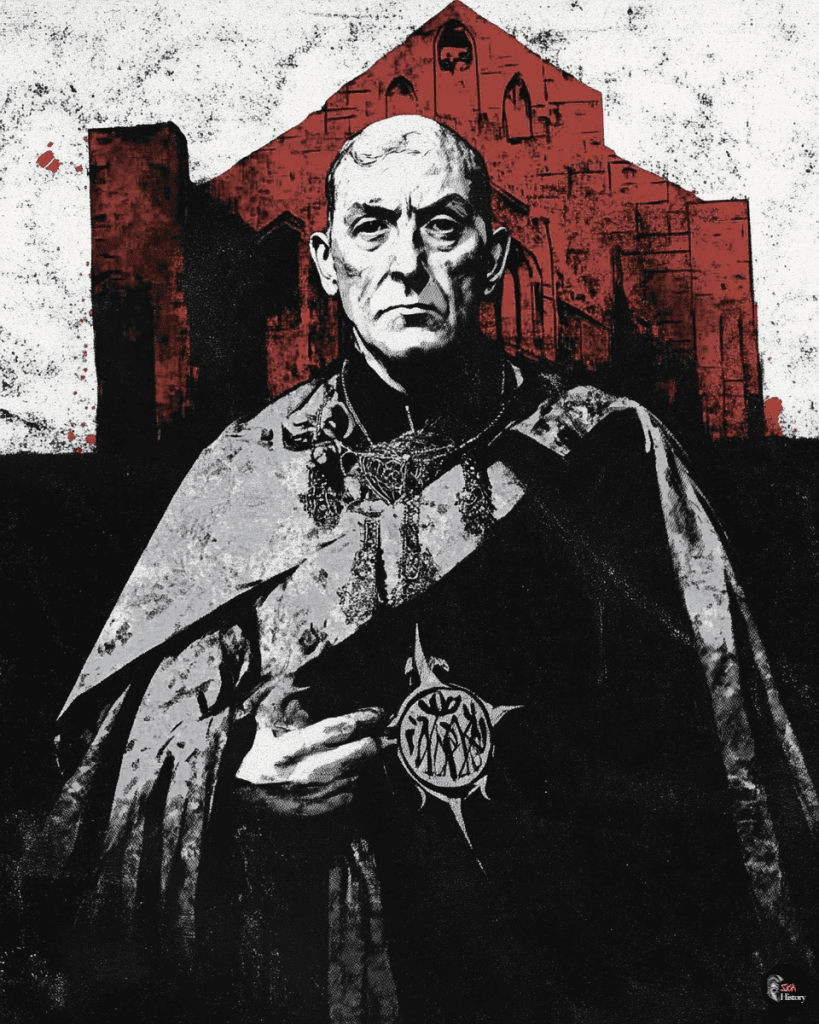Aleister Crowley, often dubbed the “wickedest man in the world,” was a controversial figure who left an indelible mark on Western esotericism and counterculture.
Born in 1875, this English occultist, writer, and mountaineer founded the religion of Thelema, which continues to influence spiritual seekers today.
Crowley’s most significant contribution to occult literature was “The Book of the Law,” which he claimed was dictated to him by a supernatural entity in 1904.
This work formed the cornerstone of Thelema, a philosophy centered on the maxim “Do what thou wilt shall be the whole of the Law.”
Crowley’s teachings blended elements of ceremonial magick, Eastern mysticism, and Hermetic traditions.
The self-proclaimed “Beast 666”, Crowley was a prominent member of the Hermetic Order of the Golden Dawn before founding his own magical orders, including the A∴A∴ , and later taking control of the Ordo Templi Orientis.
His infamous Abbey of Thelema in Sicily became a laboratory for his unconventional spiritual practices, drawing both devotees and critics.
Despite his controversial reputation, Crowley’s ideas continue to influence modern occultism and popular culture.
The Enigmatic Figure of Aleister Crowley
Aleister Crowley, a controversial occultist and self-proclaimed prophet, left an indelible mark on Western esotericism and popular culture.
His complex persona and unconventional teachings continue to fascinate and polarize audiences decades after his death.
The Wickedest Man in the World
Aleister Crowley earned his notorious reputation through his eccentric lifestyle and provocative ideas.
Born in 1875, he rejected his strict Christian upbringing and embraced the occult.
Crowley’s exploration of ceremonial magick and his founding of the religion of Thelema set him apart from his contemporaries.
His hedonistic pursuits and open defiance of societal norms shocked Victorian sensibilities.
Crowley’s experimentation with drugs and unconventional sexual practices further fueled public outrage. The British press dubbed him “The Wickedest Man in the World,” a title that both amused and pleased him.
Crowley’s writings, including “The Book of the Law,” challenged traditional morality and religious beliefs. His philosophy of “Do what thou wilt shall be the whole of the Law” became a rallying cry for those seeking spiritual liberation.
The Beast 666 and His Enduring Legacy
Crowley’s self-identification as “The Beast 666” solidified his reputation as a dark and mysterious figure.
This biblical allusion, combined with his occult practices, made him a polarizing personality in the realm of Western esotericism.
Despite the controversy surrounding him, Crowley’s influence extended far beyond his lifetime.
His ideas permeated various aspects of popular culture, from music to literature. The Beatles famously included his image on their “Sgt. Pepper’s Lonely Hearts Club Band” album cover.
Crowley’s legacy lives on through organizations like the Ordo Templi Orientis, which continue to study and practice his teachings.
His blend of Eastern and Western mystical traditions has inspired generations of seekers and artists, cementing his place as a pivotal figure in the history of occultism.
Religious and Mystical Philosophies
Aleister Crowley’s spiritual journey led him to develop and embrace various esoteric philosophies.
His quest for knowledge and enlightenment shaped the landscape of modern occultism and influenced countless followers.
The Birth of Thelema
Thelema, Crowley’s religious and philosophical system, emerged in 1904 during a trip to Egypt.
The central tenet of Thelema is “Do what thou wilt shall be the whole of the Law,” emphasizing personal will and individual purpose.
Crowley claimed to have received The Book of the Law from a supernatural entity named Aiwass. This text formed the foundation of Thelemic philosophy and practice.
Thelema incorporated elements from various traditions, including Egyptian mythology, Kabbalah, and yoga. It emphasized self-discovery, magical rituals, and the pursuit of one’s True Will.
Hermetic Mysticism and the Golden Dawn
Crowley’s mystical journey began with his involvement in the Hermetic Order of the Golden Dawn.
This influential occult society introduced him to ceremonial magic, astrology, and Tarot.
The Golden Dawn’s teachings heavily influenced Crowley’s magical practices and writings. He absorbed their system of correspondences, ritual structures, and Kabbalistic concepts.
Despite conflicts with other members, including poet W.B. Yeats, Crowley’s time in the Golden Dawn shaped his magical worldview and techniques.
Ordo Templi Orientis: Structure and Beliefs
The Ordo Templi Orientis became Crowley’s primary vehicle for spreading Thelemic teachings.
He reshaped this fraternal organization to align with his philosophies.
Ordo Templi Orientiss’s structure included a series of initiatory degrees, each revealing deeper mystical truths. The order combined elements of Freemasonry, Eastern mysticism, and sexual magic.
Crowley’s version of the Ordo Templi Orientis emphasized the practice of sex magic as a means of spiritual enlightenment and magical power. This controversial aspect set it apart from other occult groups of the time.
Literature and Practices
Aleister Crowley’s literary works and occult practices form the cornerstone of his legacy. His writings and rituals continue to influence modern esoteric thought and practice.
The Book of the Law: Crowley’s Revelation
The Book of the Law, also known as Liber AL vel Legis, stands as Crowley’s most significant work.
He claimed to have received this text through divine revelation in 1904 while in Egypt. The book outlines the principles of Thelema, Crowley’s new religious and philosophical system.
Its central tenet, “Do what thou wilt shall be the whole of the Law,” encapsulates Thelema’s emphasis on individual will and personal freedom.
The text is divided into three chapters, each attributed to a different Egyptian deity: Nuit, Hadit, and Ra-Hoor-Khuit.
Crowley spent years interpreting and expanding upon The Book of the Law, producing numerous commentaries and incorporating its teachings into his other writings and practices.
Ceremonial Magick and Occult Rituals
Crowley’s approach to ceremonial magick blended elements from various traditions, including Hermeticism, Kabbalah, and Eastern mysticism.
He developed a complex system of rituals and practices designed to achieve spiritual enlightenment and manifest one’s True Will.
Key elements of Crowley’s magickal system include:
- Invocations and evocations of spiritual entities
- The use of talismans and sigils
- Sexual magick practices
- Meditation and yoga techniques
Crowley documented these practices in works such as Magick in Theory and Practice and The Book of Thoth, providing detailed instructions for aspiring magicians.
The Abbey of Thelema: A Crucible of Occult Practice
In 1920, Crowley established the Abbey of Thelema in Cefalù, Sicily. This experimental community served as a living laboratory for his teachings and practices.
Residents engaged in daily rituals, meditation, and artistic pursuits aimed at spiritual development.
The Abbey’s walls were adorned with provocative murals depicting Crowley’s visions and teachings. Participants explored unconventional lifestyle choices, including open sexuality and the use of entheogens.
Despite its short-lived existence, the Abbey of Thelema became a symbol of Crowley’s radical approach to spirituality and personal liberation. It continues to fascinate and inspire modern occultists and counterculture enthusiasts.
Cultural Impact and Historical Context
Aleister Crowley’s influence on Western esotericism and popular culture has been profound and enduring. His controversial ideas and practices shaped occult thought and left an indelible mark on counterculture movements.
Victorian Occultism and its Revival
The late 19th century saw a resurgence of interest in the occult, providing fertile ground for Crowley’s ideas.
This revival was fueled by disillusionment with traditional religion and a fascination with Eastern mysticism. Crowley emerged as a key figure in this landscape, joining the Hermetic Order of the Golden Dawn, a secret society dedicated to the study of occult practices.
His flamboyant personality and radical ideas soon set him apart.
Crowley’s exploration of sex magick and his open bisexuality shocked Victorian sensibilities.
Western Esotericism’s Influence
Crowley’s impact on Western esotericism was transformative. His system of Thelema, outlined in “The Book of the Law,” introduced new concepts to occult philosophy.
The central tenet, “Do what thou wilt shall be the whole of the Law,” became a rallying cry for individualism in spiritual practice.
His writings on ceremonial magick, Qabalah, and Tarot continue to influence modern occultists.
The Ordo Templi Orientis, which Crowley led, remains active today. His reinterpretation of the Tarot deck, the Thoth Tarot, is still widely used by practitioners.
Counterculture and Crowley’s Modern Resonance
Crowley’s ideas found new life in the counterculture movements of the 1960s and beyond.
His emphasis on personal freedom and rejection of conventional morality resonated with the hippie ethos.
Rock musicians like Jimmy Page and David Bowie drew inspiration from his works.
In popular culture, Crowley’s image as an occult figure has been both celebrated and vilified.
Today, Crowley’s influence extends to various subcultures, from Goth to New Age spirituality.
His writings continue to be studied and debated, ensuring his lasting impact on alternative spiritual and philosophical thought.

